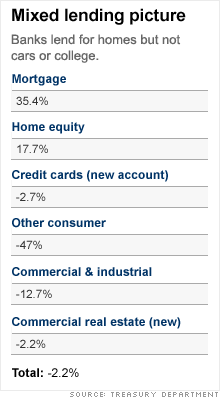Stress tests: What they mean for lending
The nation's biggest banks have to raise $75 billion in capital, but it won't have much impact on their loan-making. An economic recovery is more important.
NEW YORK (CNNMoney.com) -- Now that we know from the government's stress tests that the American banking system will survive, the question remains what will happen to lending.
The answer is not clear. In fact, experts can't even agree about how much banks are lending now. Some say they've increased the availability of credit since receiving government capital injections, while others say they're still holding back.
They do agree, however, that the stress testing the major banks have recently undergone will have little impact on their lending practices. The tests focused on how much capital the nation's largest banks would need if the economy continued to weaken. While some institutions passed with flying colors, 10 will need to raise a total of $75 billion.
What's even more important than more capital is a more stable economy. As long as home prices are falling and unemployment is rising, banks will be hesitant to lend.
"Politicians expect banks to increase lending in the midst of a recession," said analyst Nancy Bush, founder of NAB Research. "That's just stupid. Lending won't loosen that much for a long time."
And, of course, few industry observers want to return to the days when all you needed to qualify for a loan was the ability to fog a mirror. The current credit contraction is painful, but necessary, they say.
To be sure, banks are still making loans. But, as everyone knows, they've tightened their lending standards amid the economic meltdown. Therefore, many people with marginal, or even average, credit are finding it harder to get a loan.
"Banks are trying to lend to qualified customers in every instance they can," Bush said. "It's simply that the qualifications have changed."
Also, a major source of credit has run dry. Many consumers used to turn to non-bank institutions to get loans for cars, college and even homes. But these financial firms depended on bundling these loans into securities and selling them, a market that has evaporated.
And, with the economy in a tailspin, many people have shifted to saving rather than spending money. This has cut into some of the demand for new loans.
Overall, the median change in lending at the top 21 institutions that received capital infusions from the government was a decline of 2% in February, compared to January, according to the Treasury Department. Nine banks increased their lending, while 12 pulled back.
Credit availability differed considerably depending on the type of loan. Mortgage origination, for instance, jumped 35.4%, while consumer loan origination for cars and college fell by 47%.
Where one goes to get a loan matters, too. JPMorgan Chase (JPM, Fortune 500), for instance, says that it made 32% more mortgage loans in the first quarter than it did in the same period a year earlier, and 87% more than it did in the fourth quarter. Its auto loan origination is down 22% year-over-year but has doubled from last quarter.
The bank, however, opened fewer new credit card accounts in the first quarter. The number fell 35% from the previous year and 42% from the previous quarter.
Mortgage originations at Citigroup (C, Fortune 500), meanwhile, fell 40% in the first quarter from the year-earlier period but rose 35% from the prior quarter, according to company filings. Auto loans dropped 88% from a year ago and 40% from a quarter ago.
There are fewer credit cards available at Citigroup, as well. The number of open accounts dropped 10% from a year ago and 3% from the previous quarter.
Under attack from politicians and people alike, many banks have been touting the lending they are doing.
"In particular, we remain committed to safe and sound lending and to being a responsible corporate citizen," said JPMorgan Chase CEO Jamie Dimon, after the stress test results were made public Thursday. "In the first quarter of this year alone, JPMorgan Chase lent more than $150 billion to consumers, small businesses, non-profits, municipalities, corporations and others."
Of course, there are more than just 21 banks in America. The retreat of the largest institutions has meant opportunities for the nation's 8,000 community banks.
Some 40% report an increase in loan originations over the last year, according to a February survey by the Independent Community Bankers of America. Only 11% said the crisis has "significantly" curtailed their ability to lend.
"A lot of community banks are picking up business from bigger banks," said Bert Ely, a longtime industry analyst. ![]()



